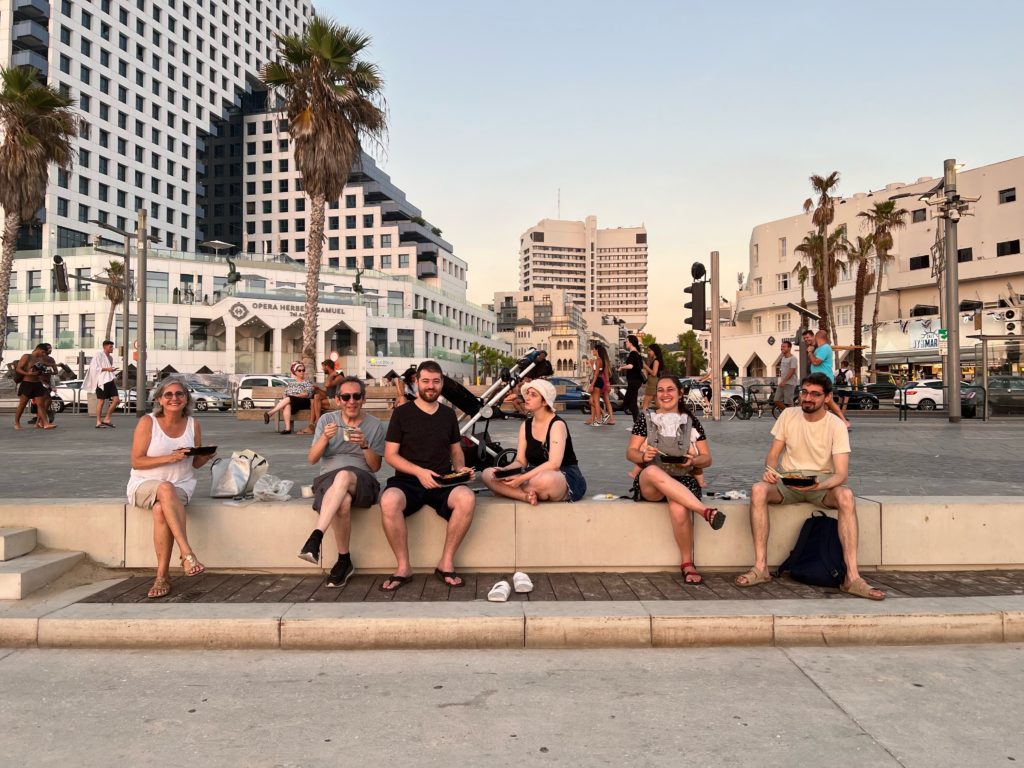When my wife, Jody, received an email from one of Israel’s leading hotel chains announcing a brand-new hotel in a refurbished historic building in central Tel Aviv, with a 35% discount for opening week, we thought, “This is an opportunity we can’t afford to miss.”
We were looking for a way to mark the imminent departure of our youngest son, Aviv, who is moving to New York to study jazz at the New School in Manhattan. This new hotel – especially with the substantial break – seemed like just the ticket for “celebrating” this bittersweet milestone with the whole family.
It wasn’t easy to find a date that worked for our three adult children and their partners, not to mention eight-month-old Ilai. But it all worked out and we were excited to lounge around the rooftop pool overlooking iconic Rothschild Boulevard.
About a week before the trip, Jody received a phone call from the hotel chain. They had changed their policies and were no longer allowing children under the age of 10 to stay. They would be happy to transfer us to another one of the chain’s properties.
I was livid. We had picked this hotel specifically. The other hotel, while I’m sure it would have been fine, simply didn’t have the same cool urban vibe.
“I want an upgrade,” I demanded of the customer service representative on the phone. The hotel we were originally supposed to stay at – and the one they wanted to move us to – were both 4-star. The chain had a 5-star hotel along the beach, too.
“Move us there,” I said.
“It’s impossible,” the representative protested.
“Look, you’re canceling us. We deserve something extra,” I countered.
“We’re not canceling you. We’re just moving you.”
Up until this point, I had remained relatively calm. But this was not the kind of customer service I expected from such a top-end chain. After all, if you get bumped from a flight, you get compensated – with money, a hotel room, a better seat. Why is it so hard for Israeli service reps to adapt the adage that “the customer is always right?”
By arguing with us, instead of working towards a mutually agreeable solution, they stood to lose us as loyal, happy customers.
“Let me talk with my supervisor,” the rep said.
A new voice came on the line.
“We can transfer you to the 5-star, but it will cost another NIS 400 a night, per room.”
“But you canceled us!” I sputtered again, my voice rising now. “We spent a lot of time getting everyone in our party on board. If you can’t help us out here, we’ll have no choice but to consider halting our hotel club membership.”
“Let’s both think about this overnight,” she responded.
The next morning, the hotel chain called. I steeled myself for another battle. The message was curt but positive.
“We are upgrading you to the 5-star. No extra charge.”
The customer service rep didn’t sound happy, but that wasn’t my problem. We had won! I had used my Israeli chutzpah to get what I wanted.
So why did I feel so dirty?
After 28 years in Israel, I’m still not comfortable using anger to get my way. I don’t cut in lines; I don’t flash my lights while on the highway to get the driver in front of me to speed up. In California, I always got better service by being polite. Yelling at a clerk is never good for building long-lasting relationships. I’m OK being assertive, but did I have to go ballistic?
“That was barely ballistic,” Aviv said, as he overheard the phone exchange from another room. “A real Israeli [by which he meant a Sabra born and bred here] would have gotten much nastier.”
Chutzpah has both positive and negative connotations, Alan Dershowitz explains in his 1991 book of the same name. “To the perpetrator of chutzpah, it means boldness, assertiveness, a willingness to demand what is due, to defy tradition, to challenge authority, to raise eyebrows. To the victim of chutzpah, it means unmitigated gall, nerve, uppityness, arrogance, hypocritical demanding.”
Or, as former Apple evangelist and author Guy Kawasaki puts it, chutzpah is when you “call up tech support to report a bug in your pirated software.”
The 5-star hotel was an exemplary experience. The rooms had spectacular views of the Mediterranean. The pool featured plenty of shade plus spicy waffle-shaped French fries. Breakfast was even more lavish with not just scrambled or fried eggs on offer but spinach and salmon-laden Eggs Benedict if one preferred, plus all the cheeses, fish and pastries you could eat (although, unlike the current culinary rage at other elite properties, there was no knafeh on the dessert tray).
There was one fashla (mistake) that made me wonder whether the customer service problems were not limited to the phone folks. When we got to our room, it stunk of smoke – even though there was a clear “no-smoking” sign on the door.
We called reception to ask for another room.
Leonid arrived after a 15-minute wait with a spray can filled with air freshener.
“Maybe we should just stay,” I suggested to Jody. “When the air conditioning is turned on, I bet we won’t even notice the smell.”
“No,” Jody said emphatically. “This is not acceptable.”
When Leonid realized from our protestations that his magic spray was not going to do the trick, the hotel’s manager quickly appeared with the keys to a different room – a tad smaller but at least there was no stench.
All that was required was a little assertiveness, no chutzpah needed at all.
I first wrote about chutzpah at The Jerusalem Post.


